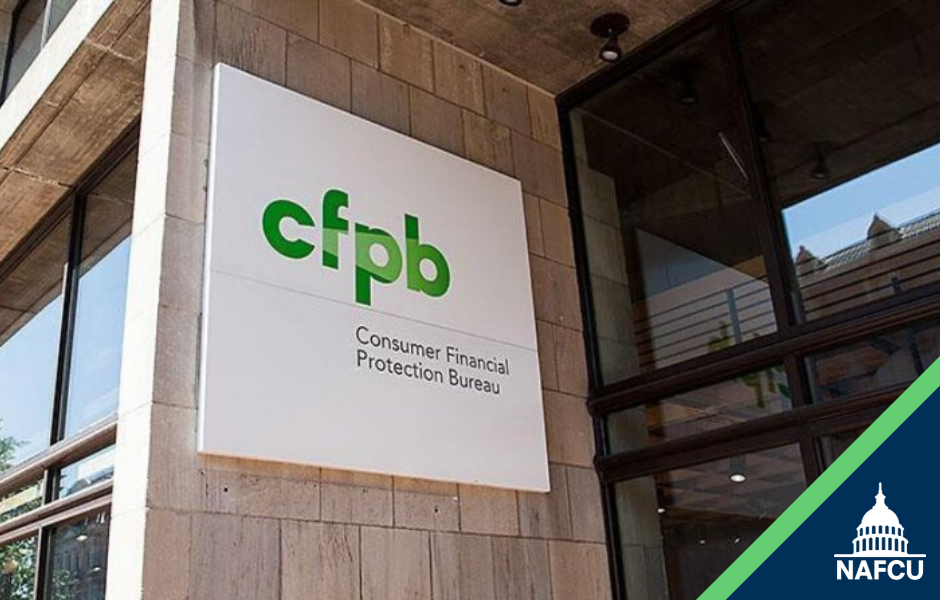Newsroom
NAFCU shares comments on CFPB’s nonbank orders registry rule
 The CFPB in January issued a proposed rule to require covered nonbanks that are under final public orders from a federal, state, or local agency in connection with a consumer financial product or service to report the existence of such orders to a bureau registry. The bureau also proposed to require certain supervised nonbanks to submit annual written statements regarding compliance with each underlying order, signed by an attesting executive who has knowledge of the entity's relevant systems and procedures for achieving compliance and control over the entity's compliance efforts.
The CFPB in January issued a proposed rule to require covered nonbanks that are under final public orders from a federal, state, or local agency in connection with a consumer financial product or service to report the existence of such orders to a bureau registry. The bureau also proposed to require certain supervised nonbanks to submit annual written statements regarding compliance with each underlying order, signed by an attesting executive who has knowledge of the entity's relevant systems and procedures for achieving compliance and control over the entity's compliance efforts.
NAFCU Regulatory Affairs Counsel James Akin submitted comments to the bureau, sharing support for the rule to make these orders public and hold covered entities accountable through annual attestations of compliance. However, Akin noted that the CFPB should conduct additional supervision over underregulated nonbanks, including fintechs, by exercising its authority over larger participants in the consumer financial market.
“NAFCU encourages all relevant regulators to ensure that when fintechs compete with traditional financial institutions, they do so on a level playing field where smart regulations and consumer protections apply to all actors in the consumer marketplace,” wrote Akin.
In the comment letter, Akin noted that this registry has the “potential to capture the conduct of those fintechs and nonbanks that lack supervision,” and clearly demonstrate their inability to comply with consumer protection laws, which would make the case as to whether they should be brought under federal supervision.
The registry would also serve as a disincentive for fintechs that might otherwise violate consumer financial protection laws and allow traditional financial institutions, such as credit unions, to have a central repository of information regarding the conduct of nonbank covered persons to better inform them when choosing to partner with these entities.
Akin added that NAFCU strongly objects to the proposal’s suggestion that the bureau “might at some point consider collecting or publishing the information described in the proposal” from credit unions. Credit unions already complete necessary and reporting as part of their adherence to NCUA’s reporting standards.
Attempts to require credit unions to fulfill this additional level of reporting as required by this proposal would be “burdensome, duplicative, and wholly unnecessary,” Akin noted.
Read the letter. NAFCU will continue to monitor the latest on the rule and will provide credit unions with the latest update via NAFCU Today.
Share This
Related Resources
Add to Calendar 2024-06-26 14:00:00 2024-06-26 14:00:00 Gallagher Executive Compensation and Benefits Survey About the Webinar The webinar will share trends in executive pay increases, annual bonuses, and nonqualified benefit plans. Learn how to use the data charts as well as make this data actionable in order to improve your retention strategy. You’ll hear directly from the survey project manager on how to maximize the data points to gain a competitive edge in the market. Key findings on: Total compensation by asset size Nonqualified benefit plans Bonus targets and metrics Prerequisites Demographics Board expenses Watch On-Demand Web NAFCU digital@nafcu.org America/New_York public
Gallagher Executive Compensation and Benefits Survey
preferred partner
Gallagher
Webinar
Add to Calendar 2024-06-21 09:00:00 2024-06-21 09:00:00 The Evolving Role of the CISO in Credit Unions Listen On: Key Takeaways: [01:30] Being able to properly implement risk management decisions, especially in the cyber age we live in, is incredibly important so CISOs have a lot of challenges here. [02:27] Having a leader who can really communicate cyber risks and understand how ready that institution is to deal with cyber events is incredibly important. [05:36] We need to be talking about risk openly. We need to be documenting and really understanding what remediating risk looks like and how you do that strategically. [16:38] Governance, risk, compliance, and adherence to regulatory controls are all being looked at much more closely. You are also seeing other technology that is coming into the fold directly responsible for helping CISOs navigate those waters. [18:28] The reaction from the governing bodies is directly related to the needs of the position. They’re trying to help make sure that we are positioned in a way that gets us the most possibility of success, maturing our postures and protecting the institutions. Web NAFCU digital@nafcu.org America/New_York public
The Evolving Role of the CISO in Credit Unions
preferred partner
DefenseStorm
Podcast
AI in Action: Redefining Disaster Preparedness and Financial Security
Strategy
preferred partner
Allied Solutions
Blog Post
Get daily updates.
Subscribe to NAFCU today.
